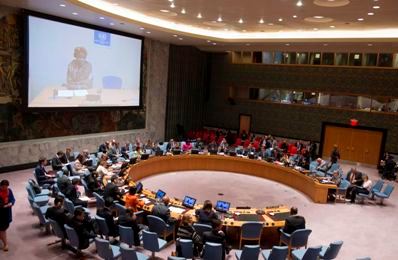UN Security Council votes for third party foreign force to South Sudan
August 12, 2016 (NEW YORK) – United Nations Security Council (UNSC) has voted in favour of deployment of a third party foreign force to the South Sudanese capital, Juba, to provide protection to civilians at risk and key installations in the world’s youngest nation.

The Friday resolution in New York increases the force levels of the current United Nations Mission in South Sudan (UNMISS) from its current 12,000 up to a ceiling of 17,000 troops, including 4,000 troops for a ‘Regional Protection Force’ which would be deployed largely in Juba.
John Prendergast, Founding Director of the Enough Project, welcomed the vote saying “Beefing up the protection of civilians in high risk areas is a crucial upgrade to the international community’s response to the South Sudanese crisis”.
However he called to increase the international pressures to ensure the unhindered deployment of that force, the humanitarian access and the implementation of the peace agreement.
“The best way to enhance international leverage is to impose targeted sanctions on spoilers and move forward with an arms embargo. Threats no longer seem to faze those prosecuting the war,” he further emphasized.
The resolution reflects the decisions in the 5 August communiqué adopted by “IGAD Plus”—the Intergovernmental Authority on Development (IGAD), plus several other regional actors.
In its communiqué IGAD Plus earlier called on the UN Security Council to “urgently extend the mission of UNMISS with a revised mandate including the deployment of the Regional Protection Force with distinct responsibilities under the direct command of a commander who will report to the overall UNMISS Force Commander, to be based in Juba”.
The IGAD document, released in the Ethiopian capital, Addis Ababa, also noted the position of the government of South Sudan accepting, “in principle,” the deployment of the force.
The UNSC resolution demands an immediate end to the ongoing fighting around the capital, Juba, and beyond, and that the government of South Sudan complies with its obligations vis-à-vis UNMISS as set out in the status of forces agreement.
There have been reports about incidents involving severe restrictions on the mission’s freedom of movement, including of flights and transportation of vital supplies, as well as acts of hostility such as intimidation, injury and detention of UNMISS staff members, among others.
The regional force is expected to include contributing troops from Ethiopia, Kenya and Rwanda as Sudan and Uganda have pulled out from contributing troops for the mission.
During the negotiations at the United Nations, members also raised questions about other elements of the draft resolution. Several were concerned about the sovereignty of South Sudan and wanted to be reassured that the government supported the plan, including Russia which indicated that it was prepared to accept whatever measures were acceptable to Juba.
While the IGAD Plus communiqué suggested that the government had given its consent, there were conflicting reports coming out of Juba. Nevertheless, some of these members may have been persuaded of the need to strengthen UNMISS. This is to support the draft resolution following the statement from the AU Peace and Security Council issued on 11 August, echoing the IGAD Plus communiqué, and calling for the Council to “extend the Mission of UNMISS with a revised mandate” including the deployment of the Regional Protection Force.
The opposition faction led by former First Vice President, Riek Machar, and SPLM former Secretary General Pagan Amum welcomed the deployment of the third party force to ensure security and protection in the capital.
(ST)
